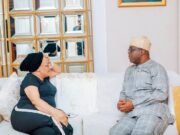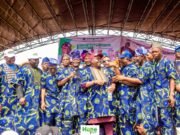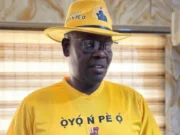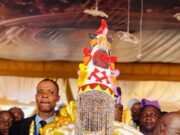It is 23 years today that Fela joined the pantheon of the music gods. Yet his music remains immortal. In the heyday of military dictatorship, when guns and boots were the symbols of power and tyranny, he built up his powerful weapon of song to confront and challenge the deciders and shapers of Nigeria’s fate to attend to sundry socio-political and economic issues afflicting the common man. He was Fela Anikulapo, the one who has death in his pouch. His protest rhythms and stubborn fervour to hold martial administration to account stood him out of a horde of his contemporaries who witnessed naked injustice and highhandedness in those dark days of military rule but were bereft of the bravado to kick. In those prophets, who befriended absolute power when it corrupted absolutely, the man died (apologies to Wole Soyinka).
Afrobeat legend, Fela, fought but didn’t run away. He lived to fight another day. What he philosophized of political power is timeless. They are cesspits of our enduring realities. In his songs, we see ourselves; our customary inactions and how we selfishly collapsed the path to nationhood. His music radiates insights, philosophy and hidden truth we loathe with foul ego. Where the famished citizens feared to walk, he trod it with bruises which he saw as garlands. He didn’t go into his many battles with the intention to share the ill-gotten gains of war; he fought because his skin unlike many of his compatriots was allergic to the loutishness of unknown and familiar soldiers. His heroism was unsung; his melody was a horsewhip on the buttocks of power blocs. Fela was a tornado of a man but loved humanity, opined Spencer Neil.
He was born into the Ramsom-Kuti family in Abeokuta. His father, who served as first President of the Nigeria Union of Teachers (NUT), was a school principal and minister in the Anglican Church. His mother was a female rights activist extraordinaire who was a torn in the flesh of the British colonial lords. The protest she led against arbitrary taxation forced Oba Ademola to abdicate his throne in 1949. Hence, Fela could have become heir to the genes of activism in his mother. Determined to make a medical doctor out of their son, his father sent to London to study medicine but he gave in to his hatchling defiant personality by opting for music in its place. Rather than saving lives through syringes, he tendered to the victims of military’s despotism with soothing ointment of his music. While his personality might have spinned controversies, his love for the downtrodden was inimitable. He loved Nigeria more than we loved him.
His transition from soft to hard tune was influenced by his meeting with Sandra Smith (now Sandra Izsadore) in the United States. Smith initiated him into the world of the Black Power movement. On his homecoming, he renamed his band Afrika ’70 and named his home Kalakuta Republic. His very popular album Zombie got him into trouble with the Nigerian military. It was an arty derision of soldiers’ brutish engagement with the citizens. Angered by his depreciatory description of them, about 1,000 soldiers laid siege to his apartment and beat him severely. His mother, who stayed opposite Fela’s residence, was thrown from a window. Funmilayo Ransom-Kuti, described as the Lioness of Lisabi by the West African Pilot of 1947, died from the injuries sustained from the momentary psychosis of the state. The deadly Kalakuta experience birthed the song that would later become a street hymn, Unknown Soldier, an artist dissent response which sums up the duplicity and the cowardly nature of the military authorities that ordered the assault on Fela’s house but lack the courage to own up.
Fela was a mix of many wonders. He married 27 wives, who were his dancers and composers, in a day. This polygamist move was intended at rubbishing the government’s claims that Fela was abducting the women. This marriage also lays bare his conviction in Africa as the heart of patriarchy. He was an advocate of traditional African culture. Besides, in an apparent response to an attack on his mother and her ensuing death, he delivered her coffin to Dodan Barracks in Lagos which housed the military junta at the moment in time. It was his own oddball way of throwing down the gauntlet at the doorstep of his traducers. Despite his strong criticism of members of the clergy and Islamic heads, whom he saw as religion merchants, he was not an atheist. He did foreground in his music how religious bigotry has undeveloped Africa and bred well-heeled spiritual leaders who lavish in material comfort even as their laity befriend poverty.
Fela’s Afrobeat is a fusion of African chants, jazz, funk and highlife from Nigeria and Ghana. He used this music style as a vehicle to profess his ideology of Nkrumahism whose major plank is decolonization of Africa, the continent’s unity and the attainment of an egalitarian society. True to this philosophy, he lashed out in the songs like, Beasts of No Nation, against the apartheid government in South Africa and colonial activities of the British in former Rhodesia (now Zimbabwe). For his harsh criticism of Nigeria’s militaristic government, he was jailed by Olusegun Obasanjo’s regime. Fela was hounded in prison in 1984 for 20 months by the military government of Muhammadu Buhari on a charge bordering on currency smuggling which many saw as a political witch-hunt aimed at stifling the rebel in him.
Fela seemed to believe that constant criticism of the ruling class without active participation of the critic in the political process in order to mop up the society is not enough to engender the systemic change he wanted happen. Hence, he offered himself for president in the 1979 elections when he formed his own political party, Movement of the People (MOP), but his candidature was denied. This rejection is explicable as Fela was the wet dream of any corrupt government and crooked multinationals that controlled the political space in those days of military dictatorship.
Despite being persecuted and prosecuted, he was fearless and refused to trade his conscience for filthy lucre. He sang for freedom, justice and liberty. Herald Sun of 2011 described him as Che Guevara and Bob Marley rolled into one person. He was tough on corrupt leaders but soft on death. When he died in August 1997 of HIV-related complications, more than one million people attended his burial. A testimony that he lived and breathed his last for the people.
Thompson Taiwo is a broadcast journalist. You can follow him on twitter @thompson_taiwo.





































